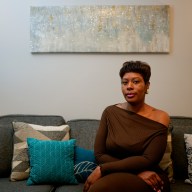Hayley Squires’ favorite film of 2013 was “The Wolf of Wall Street.” “I was so happy it was unapologetic. Everyone was like, ‘It’s so gratuitous!’ Yeah, because he’s telling the truth! How often do you watch a film nowadays where people don’t apologize for the tone they take?” she tells us, before adding, “It’s kind of like ‘I, Daniel Blake.’” As it happens, Squires is one of the two stars of “I, Daniel Blake,” the latest from Ken Loach, one of the great poets of the working class. For the last 50 years, the English filmmaker has consistently churned out smart, lived-in and angry films about those who society ignores. Films like “Kes,” “Riff-Raff” and “My Name is Joe” are looks at the downtrodden. Loach has twice taken the top prize at Cannes, first for 2006’s “The Wind That Shakes the Barley,” and earlier this year for “I, Daniel Blake.” In his latest, the comedian Dave John plays the title character: a sick laborer caught up in a tangled bureaucratic nightmare. Red tape prevents him from receiving disability. He meets Squires’ Katie, who has similar problems receiving benefit checks tofeed her two young children. Daniel and Katie join together to fight and to look out for the other. RELATED: Review: “I, Daniel Blake” is typical Ken Loach, only more topical In America, Loach’s films are peddled on the art house circuit, watched largely by cinephiles. In his native U.K., it’s different.
“He’s not commercial, but he’s kind of a legend,” Squires says. When they shot scenes in a New Castle food bank, people crowded outside, as though he was a celebrity. “They all knew him. These are people who probably watch Hollywood blockbusters. But they recognize him and know him. They know what a figure he is in political context of our country, but also because of the voice he’s given to the working class.” Squires, 26, grew up watching Loach’s films. She started, at 14, with 2002’s “Sweet Sixteen,” about a Scottish teenager. She cites that — and “Goodfellas” — as the films that made her want to act. She thanks her father, “a massive film buff,” for turning her his movies. “It’s so weird now that I’m in a Ken Loach film,” she says. Squires studied acting in school. Before Loach came calling, she had small roles on the Channel 4 series “Southcliffe,” with Rory Kinnear and Shirley Henderson, and in last year’s “A Royal Night Out.” In her breakthrough role, she possesses the usual quality you expect from Loach actors: She seems like she was plucked from real life, not from a casting union. “A lot of people think the actors in Ken Loach films aren’t actors,” Squires explains. “Sometimes that’s the case. A lot of the time it isn’t. He tends to find people who, had their life gone another way, could have easily been in the characters’ situation.” One of his tricks for getting lived-in performances is not ever giving his actors a full script until the last time they’ve called “cut” on the final day of shooting. Instead, he “drip-feeds” them the script day-by-day. Everything is shot chronologically. “It’s an actor’s dream to not have the script sitting in your head — to think, ‘By day 15 I’ve got to get to this point,’” Squires says. “It takes the pressure off. It makes your job so much easier and so much more enjoyable. The fact that he trusts that you are going to be able to reach that point on your own makes you invest more.” Loach didn’t even reveal the ending of “I, Daniel Blake” to his two main stars until they were shooting the scenes in question. We won’t reveal it either, but it’s shocking enough that Squires was happy when, after shooting one of the scenes, Loach invited her and others out for Chinese food, making sure she wouldn’t simply go back to her hotel to cry. As preparation, Squires visited with women in similar situations, who live in homeless hostels or had moved on to their own apartments. The hostel rooms tended to be small — smaller, she says, than even our modest interview room — and it had to house an entire family. “You pick up on how they interacted with their kids, as well as the energy of these women, who’ve been beaten so badly by the system that’s supposed to look after them,” she explains. “A lot of them survive with an energy of anger, or they’re consistently pissed off. If they weren’t consistently pissed off, they would break. “They say if you don’t laugh, you cry. If you don’t have anything to laugh about or anyone to laugh with — if it’s just you and your kids — the only thing to do is be angry. I think anger is an amazing energy. It can be very dangerous, but it can also give a lifeline to people who need to see things through.” Since “I, Daniel Blake” made its Cannes premiere, much has changed. Brexit, only an idea back in May, indeed happened, followed half a year later by the Trump election. (“You’ve got nightmare politicians and so do we,” Squire tells us.) Loach’s latest is suddenly not just another Ken Loach movie, but a film with its finger accidentally yet firmly on the pulse, speaking to the very people who will be most affected by their nation’s removal from the EU. But it also speaks to Americans. “It will be interesting to see what happens when ‘Daniel Blake’ comes out here, because our film is very unapologetic in its left wing views,” Squire tells us. “The reason it’s made that way is because the working class has been infiltrated by the media and by politicians, in order to be separated — to create a class war amongst ourselves. They tell them they’re going to get their country back, they’re going to make Britain great again. It’s propaganda for the working class to divide them and keep them down. “Ken said at Cannes, ‘That’s how the right rises,’” Squires recalls. “That’s why I’m glad the movie’s coming out here. It’s a political voice. It’s saying all is not lost. We’ve just got to come together.”
Hayley Squires on how ‘I, Daniel Blake’ is perfect for our grim times
Follow Matt Prigge on Twitter @mattprigge


















